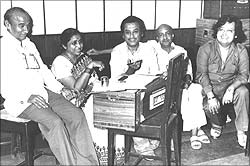Shankar Jaikishan the music synonym of Bollywood Music.They were the Super Star Music Director of golden Era of Bollywood.They molded the mood and musical mood of masses since the release of Barsat 1949.
Shankar,the more versatile of the two,was a prolific musician with mastery over many instruments,elder of the two was primarily responsible for making this great Jodi and also to build a dedicated team of Lyricist like Shailendra and Hasrat Jaipuri and musicians like Datta Ram and Sebastion.
Shankar was born on 5th Oct 1922.He started his career with a theater group run by Satyanarayan and Hemawati, before shifting to Prithvi Theatre where he played tabla and performed some minor roles in plays. It was at Prithvi theatre that he learnt to play and mastered several other instruments like Sitar, Accordion and Piano etc. Besides his work at Prithvi theatre, he also started working as an assistant to the leading composer duo of Husnlal Bhagatram and nurtured the ambition of becoming an independent music director.
He met Jaikishan at the office of a Gujrati director Chandravadan Bhatt who had promised Shankar a break as a Music Director when he produced a film.Both developed a liking for each other and it was he who then and there assured Jaikishan of the job of a Harmonium player at Prithvi theaters.While working in Prithvi Theaters, Shankar and Jaikishan used to compose tunes and were in touch with Raj Kapoor, who was working as an assistant to the famous director Kidar Sharma and was aspiring to be an actor/director. Thus, the three had met at Prithvi Theater.
Raj Kapoor made his debut as a director with the film Aag in 1948. Its music director Ram Ganguly was assisted by Shankar and Jaikishan. However, during the recording of a song for his new venture Barsaat, Raj Kapoor had some serious differences with Ram Ganguly and decided to assign its music to Shankar who insisted on taking Jaikishan as his partner. Thus came into existence the new pair of music directors named 'Shankar-Jaikishan' who composed the music for the film.
Their early works include Barsaat, Awaara, Badal, Poonam, Nagina, Aurat, Parbat, Kaali Ghataa, Aah, Patita, Shikast, Badshah, Mayur Pankh, Naya Ghar, Seema, Shree 420, Basant Bahar, Halaku, Rajhath, New Delhi, Kathputli, Anari, Chori Chori, Daag, Begunah, Yahudi, Main Nashe main hoon, Kanaiah, Boot Polish, Chhoti Behan, Sharaarat, Love Marriage,Jab Pyaar Kisi se hota hai,Asli Naqli and Ujala.
Shankar-Jaikishan were the pioneers in establishing the role of the orchestra in song compositions as a medium to express and enhance the meanings and feelings of songs rather than using it just as a `filler' as per the prevalent practice before their advent on the scene. They made use of the orchestra and musical instruments (often dozens or hundreds of them) in their songs which consisted of the following format:
Shankar Jaikishan made a major contribution towards the development of jazz music in India and the new genre Indo jazz. Their 1968 album Raaga-Jazz style is the earliest Indo-jazz recording in India
After Jaikishan's death, Shankar carried on with the banner of Shankar-Jaikishan alone,His most-successful musical hit was Sanyasi in 1975 for which he scored all songs and the entire background score based upon SJ's favorite Raag Bhairavi to prove the point that SJ's Bhairavi was as much Shankar's as that of Jaikishan.
Shankar died on 26th April 1987. His death received nominal media coverage and his funeral was attended only by his family and some friends.
Some of My Favourite Songs of Shankar Jaikishan
Song from Barsat 1949
Song from Awara 1951
Song from Daag 1952
Song from Aah 1953
Song from Patita 1953
Song from Seema 1955
Song from Shree 420 1955
Song from Chori Chori 1956
Song from Anari 1959
Song from Love Marriage 1959
Song from Jab Pyaar Kisi Se Hota Hai 1961
Song from Sasural 1961
Song from Junglee 1962
Song from Professor 1962
Song from Sangam 1964
Song from Aarzoo 1965
Song from Andaz 1971














